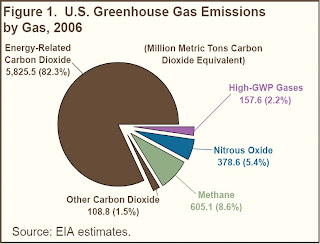Bovine Flatulence--Threat or Menace?
 Cows can digest things we can't, especially including the cellulose in grass and grain. They do this by maintaining cultures of microorganisms in their complicated series of "stomachs" that can break down cellulose. The cows then digest the microbes and the sugars and fatty acids they produce.
Cows can digest things we can't, especially including the cellulose in grass and grain. They do this by maintaining cultures of microorganisms in their complicated series of "stomachs" that can break down cellulose. The cows then digest the microbes and the sugars and fatty acids they produce.(Brief overview of ruminant digestion here. If you are interested in delving into the digestive physiology of ruminants in more detail, start here.)
Some of these microbes produce methane (CH4). Some of the other microbes can use that methane as food, but a certain amount of it escapes as belches or farts (mostly belches). (Some people have microbes in their guts which produce methane, and thus their farts also contain methane--but nothing compared to the amount cows produce.)
The publication Emissions of Greenhouse Gases in the United States 2006 (pdf) summarizes the total greenhouse gas output of the US:
 Of the 605 million metric tonnes CO2 equivalent of methane shown in the graph, about 115 million tonnes CO2e is from "livestock enteric fermentation"--mostly cow burps and farts. That is less than 20% of the methane load, and less than 2% of the 7 billion tonne CO2e total.
Of the 605 million metric tonnes CO2 equivalent of methane shown in the graph, about 115 million tonnes CO2e is from "livestock enteric fermentation"--mostly cow burps and farts. That is less than 20% of the methane load, and less than 2% of the 7 billion tonne CO2e total.Of course raising cattle causes other greenhouse gas emissions.
- There are about 56 million tonnes CO2e of methane and 55 million tonnes CO2e of nitrogen oxides released from cattle wastes as they decompose. (Some of that methane can be captured and used to generate electricity or heat, while releasing carbon dioxide, a much less potent greenhouse gas.)
- About 227 million tonnes CO2e of nitrous oxide is released from nitrogen fertilization of soils (30% of it from nitrogen fixed by the crops themselves, not from industrially produced fertilizers).
- Most of the nitrogen fertilizer used on crops (89%) is used on corn (maize). About half of the corn produced in the US is fed to livestock, a large fraction to cattle, especially dairy cows. So about 50 million tonnes CO2e emissions associated with fertilizer use should be indirectly blamed on cows.
- (Another large fraction of corn is used to make ethanol as a motor fuel, indirectly causing the release of significant amounts of greenhouse gases in the corn production. But that's another story.)
- 2% of greenhouse gas production is in the form of methane from garbage decomposing in landfills.
- Roughly 2% is chlorofluorocarbons (CFCs) from air conditioners, refrigerators and industrial processes.
- Other industrial processes (especially cement manufacture) produce about 2%.
- Burning jet fuel accounts for more than 3%.
- 12% of greenhouse gas emissions are CO2 emitted generating electricity which is used in residential applications like lighting, TVs, computers, and refrigerators.
- 17% came from burning gasoline in cars and trucks.
Reduced consumption of beef and dairy products would probably have little effect. (If half of US consumers cut their consumption of beef and dairy products in half -- and the resulting drop in prices didn't stimulate the other half to increase their consumption, or drive more exports -- it would reduce national greenhouse gas emissions by about 1%.) Maybe this will become more of an issue in the future.
Update 8 May 2012: If you think cow burps are bad, recent research suggests dinosaur flatulence was a lot worse.
David Wheat's Science In Action site has articles about science and math in the real world, weird science, science news, unexpected connections, and other cool science stuff. There is an index of the articles by topic here.
tags: global warming, climate change, carbon choices, greenhouse gas emissions, co2, methane, cattle, cows, farts, agriculture

10 comments:
Thank you for this information!
wow! what an instresting blog. i love your blog. would you like to visit my blog. it is about science experiment. the blog is - http://meinscience.blogspot.com
what about the fact that methane is FAR more potent as a atmospheric terrorist than CO2??
You might note that the figures cited are in terms of "CO2 equivalent" so the potency of the various greenhouse gases is not an issue.
Oh this is brilliant...my 10 year old just told me that THIS is the topic she wants to do her science fair project on and I was scratching my head...she may be contacting you for permission to use your blog post for her project reference/bibliography!
Eileen
wow! i didn't know that cows were that bad for the Earth!
wow that is cool.i have been read this cool book called how loud can you burp and in it it has this question do cows farts cause climate change and now i know that this book does not lie
lucy
thank you
It was very interesting for me to read this blog. Thanks the author for it. I like such themes and anything that is connected to this matter. BTW, why don't you change design :).
thnx... i was trying to prove my mom wrong...jajajajjajja
Post a Comment